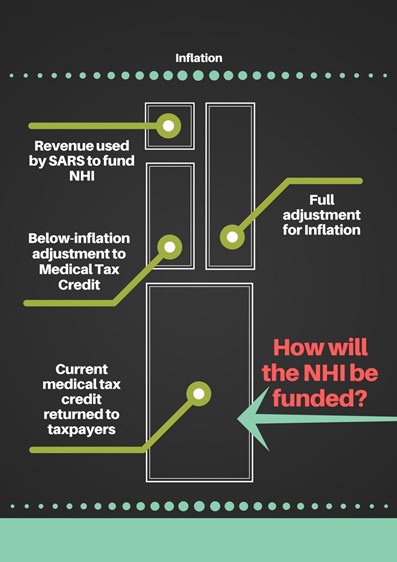The National Treasury confirmed during the Budget Speech that it will continue to fund the development of a National Health Insurance (NHI) over the next three years.
The NHI has been in the works for the last 89 years, starting with the first enquiry into national healthcare in 1928.
Close to a century later, in 2012, the Department of Health (DoH) decided to pilot the NHI scheme in 11 districts, including Tshwane and OR Tambo.
This constituted the first of 3 phases to be implemented over 14 years (refer to the table below):
|
|
Year |
Description |
|
Phase 1 |
2012 – 2017 |
Pilot programmes in designated areas |
|
Phase 2 |
2017 – 2022 |
Overseeing the NHI Fund |
|
Phase 3 |
2022 – 2026 |
Contracting of accredited private hospital and specialist services |
So far the DoH discovered that a lack of co-ordination and uncertainty in certain districts need to be resolved before implementing the scheme nationally.
The NHI has since entered its 2nd phase in 2017 which will ensure that the NHI Fund is also functional and well-managed.
How will the NHI be financed?
Taxpayers have raised concerns about how the NHI will be subsidised, and how much money will be required to sustain it.
During the budget speech, Finance Minister Malusi Gigaba answered these questions by allocating R4.2 billion towards the NHI – R700 million for 2018/19, R1.4 billion for 2019/20, and R2.1 billion for 2020/21.
“Over the next three years, below-inflation increases in medical tax credits will help government to fund the rollout of National Health Insurance,” Gigaba explained.
Every year taxpayers have the opportunity to request that the South African Revenue Service (SARS) return a percentage of the taxes they paid for their medical aid.
In 2017/18, taxpayers were allowed to receive a medical tax credit of R303 per month for the first 2 beneficiaries, and R204 per month for any remaining beneficiaries.
Just like a salary, the medical tax credit needs to be adjusted for inflation every year.
If “below-inflation increases” are allocated to the medical tax credit, taxpayers won’t receive the full extent of these returns.
As a result SARS will have more revenue than when the medical tax credit had been properly increased with inflation.

This additional revenue will be used to finance the NHI.
What will the NHI offer South Africans?
According to the most recent white paper, which was drawn up by Health Minister Aaron Motsoaledi in 2017, the NHI will have the following features:
- Progressive universalism: All South Africans will have access to quality health services that are affordable. The right to access quality health services will be based on need and not socio-economic status. NHI will seek to protect the poor and vulnerable populations to ensure that during every implementation they gain as much as those who are better off.
- Mandatory prepayment of health care: NHI will be financed through mandatory prepayment from general tax and private medical scheme contributions. No one will be allowed to opt out of this contribution.
- Comprehensive services: NHI will cover a comprehensive set of health services that will provide a continuum of care from community outreach, to health promotion and prevention.
- Financial risk protection: NHI will ensure that individuals and households don’t suffer financial hardship or are not deterred from accessing health services. The NHI will eliminate various forms of direct payments, such as user charges, co-payments and other out-of-pocket payments.
Of the R4.2 billion that has been allocated towards the NHI for the next 3 years, R2.3 billion will be dedicated towards non-personal services.
“This amount will expand the Chronic Disease Medicine Distribution Programme to enable three million patients to collect chronic medicines at their collection point of choice instead of at a clinic,” said Gigaba.
The remainder of the funds have been promised towards contracting general practitioners, widening referrals for school optometry and audiology services, and assisting with mental health issues.
If the NHI manages to overcome the difficulties in the pilot programmes and progress according to the three-phased plan, South Africans may have universal healthcare by 2026.

